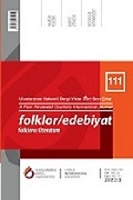Etnik Turizm: Kültürlerarası Hiyerarşinin İkame Edilmesi
Ethnic Tourism: The Substitution of Intercultural Hierarchy
Author(s): Hasan MünüsoğluSubject(s): Cultural Anthropology / Ethnology, Culture and social structure , Social Theory, Ethnic Minorities Studies, Tourism
Published by: Uluslararası Kıbrıs Üniversitesi
Keywords: ethnic tourism; cultural tourism; Dukha people; Kayan people; Kalasa people;
Summary/Abstract: Tourism is one of the routine activities of the consumption society with various subfields based on tourists’ interests such as environmental tourism, dark tourism, medical tourism, cultural tourism, etc. One of those subfields is ethnic tourism. Ethnic tourism is considered as a search for “tradition” and “authenticity” of people living in a“modern”life. Therefore, the interest in minority groups, which stand apart from the global dominant culture, tends to increase. Ethnic tourism, which is represented as an intellectual mobility toward gaining knowledge and raising awareness for cultural diversity, is the result of both cultural and social stratification and its reproduction. While the touristic projectile moves from “modern” to “traditional” and maybe even “primitive”, its participants belong to upper classes. Although indigenous people appear to be shareholders of this tourism activity, technically both these people and their culture are objectified and commodified. While claiming that ethnic tourism aids in the development of intercultural relations, it sharpens cultural borders by marginalizing diversities. For example, the level and scope of communication among tourists and indigenous people are determined by tour organizers and tourists. Tourists feel free to take pictures, to enter holy places or attend some practices. For this reason, there are warning signs regarding inappropriate behaviors for tourists in some touristic villages. This suggests that the position of indigenous people has become passive in tourism regardless if their villages are visited. This study shows how ethnic tourism creates inequality in the case of the Dukha in Mongolia, the Kalasa in Pakistan, and the Kayan people in Thailand and compares them to similar cases in Turkey, especially in non-Muslim communities. Despite having different cultural, historical, and social backgrounds, the issue that makes all these cases common is their position in this aspect of tourism. This article, therefore, discusses the reconstruction of a cultural hierarchy and the commodification of local cultures via ethnic tourism with examples and practices.
Journal: Folklor/Edebiyat
- Issue Year: 28/2022
- Issue No: 111
- Page Range: 681-696
- Page Count: 16
- Language: Turkish

